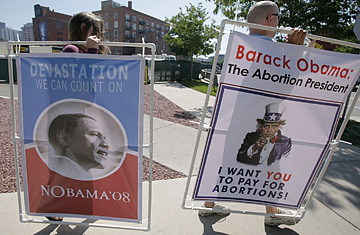
Antiabortion protestors carry posters attacking Democratic presidential hopeful Barack Obama
(2 of 2)
At the time, pro-choice leaders and legislators across Illinois joined Obama in making this argument. "It would have completely eviscerated Roe v. Wade," says Pam Sutherland, who was president of the state's Planned Parenthood chapter at the time. "[The] bills were so unclear that it would have been litigated forever." Obama was not alone in heeding these concerns. More than 20 other senators joined Obama in opposing one of the early versions of the Born Alive bill.
In addition, the bill was packaged with other legislation that would have established liability for any doctor or hospital that "harms or neglects or fails to provide medical care" for any live child after birth. Coupled with the Born Alive legislation, this would have established liability for the death of children with life signs after abortions, even if those children had no chance of survival. The Illinois State Medical Society, which represents the state's doctors, sided with Obama, opposing the package of bills because they "attempted to dictate the practice of medicine for neo-natal care and greatly expanded the civil liability for physicians."
The principle advocate for the Born Alive legislation in Illinois was Jill Stanek, a nurse who testified in 1999 that babies deemed nonviable after birth following abortions were left to die in what she called a "soiled utility room." Since then, Stanek has become an outspoken opponent of Obama's candidacy. In a recent interview, she explained that one of the purposes of the legislation was to remove the decision about a child's viability from the doctor performing the abortion, whom she maintains cannot be trusted to make an accurate judgment. "If a baby is going to be alive at his abortion, there should be a second physician on hand," Stanek said.
In recent months, Stanek has been working with an independent group, BornAliveTruth.org, which has been running television ads in swing states that feature an abortion survivor, Gianna Jessen, who says that "if Barack Obama had his way, I wouldn't be here." This claim is misleading, because Jessen was deemed viable after she was born following an abortion procedure. In an interview with TIME, Stanek argued that the ad should still be seen as accurate, since it is possible that a doctor could have made a different decision. "It is more of a hypothetical," she said. "Obama would have agreed with the abortionist if the abortionist so chose to have her be claimed nonviable."
The debate over the meaning of Obama's votes is further complicated by a legal dispute between abortion opponents and supporters over the relative meanings of the Illinois legislation and a similar federal law that President Bush signed in 2002. The federal law was unopposed by pro-choice groups, because they did not believe it would have any legal impact on abortion availability, which is generally governed by state law. "There was never any federal abortion law," explains Sutherland. "So when they passed that law, it did not change anything. It was just a statement."
Nonetheless, McCain has argued on the campaign trail that Obama should still be condemned for his state votes, in light of the federal vote. "Congress unanimously passed a federal law to require medical care for babies who survive abortions — living, breathing babies whom Senator Obama described as 'previable,' " McCain said in an August radio address. "This merciful law was called the Born Alive Infants Protection Act. Illinois had a version of the same law, and Obama voted against it."
Like Palin's statements late last week, McCain's radio address was carefully written to avoid outright falsehoods, while effectively misleading voters about the background of Obama's votes. It is true that Obama voted against a state bill that had language similar to a federal law. But the Obama campaign says Obama would not have objected to the federal law if Obama had been in the U.S. Senate at the time.
The campaign also says Obama would not have objected to an amended version of the state's Born Alive legislation, which passed after Obama left the state senate. Like previous proposals, the amended bill declared that any child born alive was a "human person," but it also specifically stated that the legislation should not be construed to "affect existing federal or state law regarding abortion" or "alter generally accepted medical standards," effectively eliminating the concerns of Obama and other abortion supporters like Sutherland that the law could be used a way to limit access to abortion.
Such complexities, however, are easily lost in the rapid-fire sound-bite contest that has predictably come to consume the presidential election. We are left instead with emotionally charged claims that mislead as much as they inform.
It is without dispute that Obama is pro-choice; he has a long record of opposing efforts that might limit legal access to abortion. To suggest, however, that Obama supported the death of children born alive after abortions is misleading. State law in Illinois, which Obama supported, has always protected the life of a child born alive after abortions, if doctors believed the child had a reasonable chance of survival.
(See photos of Sarah Palin on the campaign trail here.)
(See Pictures of the Week here.)
(See the Top Races to Watch '08 here.)
(See a gallery of campaign gaffes here.)
